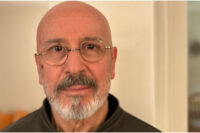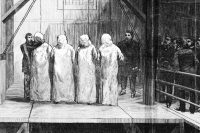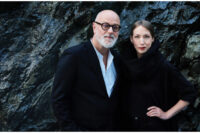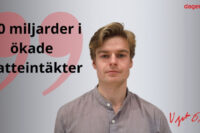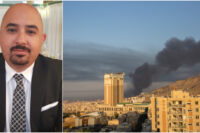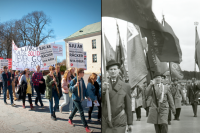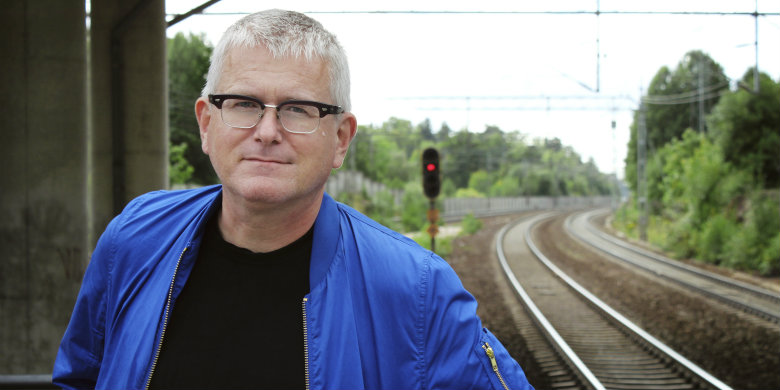
Vad måste ske för att rädda den europeiska unionens löfte om demokrati? Det frågar sig Per Wirtén på en resa genom Europas östra gränstrakter.
We travelled through the eastern parts of the EU this summer. On the road from Vilnius to Bialystok there was hardly any room for our little car among all the big, long-distance lorries. We followed the border towards Belarus and Ukraine, admiring beautiful squares in small East Slovak cities and continued on to Romania.
It was overwhelming. I had visited many of the cities and regions we passed by before, but that was just after the fall of communism some 20 years ago. What I was witnessing now was a social, economic and political miracle. The changes can only be compared with the record years in western Europe between 1945 and 1970. But while the recovery in western Europe was dependent on the US, eastern Europe has risen on account of the EU’s own power.
The political consequences for the whole union are underrated; they aren’t even included in calculations of the EU’s future. But the growing prosperity in Katowice, Presov and Prague might turn out to be as important as the collapse in Athens and Madrid.
Reports from Paris, Brussels and Berlin about new crisis meetings to save the euro kept on coming during our journey. Now Spain was faltering. But during warm evenings on the square in Presov, the crisis felt both distant and embedded in another course of events. It was like I needed to transport myself to the geographical outskirts of the Union, in order to see the full picture.
The European obscurity has become paralysing. Who understands the direction in which politics is going, where the EU is heading? Nobody even knows what next week will bring. Only one thing is evident: the one-eyed doctrine of austerity is driving the monetary union to collapse.
The political scientist Andrew Moravcsik gave intellectual support to the dream of a status quo in an article in Foreign Affairs during the spring, suggesting that Europe should be able to use some sleight of hand and wobble through the crisis. The euro is certainly a daring venture, but it will survive if everyone finally adjusts and gets in line. Moravcsik is an old authority in the European debate and his conclusions were provokingly optimistic. He simply meant that the policy to combat the crisis had been successful. The only thing needed now was for Germany and other rich parts of Europe to listen to reason and proceed with a more expansive economic policy.
But roughly at the same time another authority, the economist Paul Krugman, drew a different conclusion. In a column in the New York Times, under the headline “Apocalypse Fairly Soon”, Krugman wrote that a breakdown of the monetary union could arrive quickly and brutally.
The emergency measures, according to Krugman, were nothing but a monumental failure.
For a long while Krugman’s pessimism has felt more motivated than Moravcsik’s belief in the future. But the strongest feeling of all has been that of widespread insecurity. Is that surprising? All the important political standpoints and decisions are taken behind closed doors. Not even the differences between Merkel’s and Hollande’s fundamental views of the European project are clear to the public. The euro crisis leads inevitably to the question of Europe and democracy.
Who can still avoid thinking of the prelude to the outbreak of the war in 1914? Nobody understood the point of a war, nobody wanted it, but nobody managed to leave national prestige behind in order to prevent it. A similar pattern has returned in the game about the euro. Every time the European Parliament and the European Commission put forward a policy proposal suggesting common responsibility – eurobonds for example – the heads of governments stop them. Privileged countries such as Germany, Finland and Sweden look after their interests in conservative self-deception. They are driving the continent – and themselves – towards the abyss.
Our summer journey developed into a European pilgrimage. We explored the outskirts of the big regions that historian Timothy Snyder has called Europe’s “Bloodlands” or “Killing fields”: the geographical centre of Nazi and communist genocides where twelve million human beings were killed between 1933 and 1944.
We wandered through the concentration camp in Majdanek a few days later, now surrounded by Lublin’s expanding Growing prosperity in Katowice and Prague might turn out to be just as important as the collapse of Athens suburbs. We saw the gas chambers, the place of executions and the crematorium. We were not alone. The interest has increased to a point where the visitor now has to participate in four-hour-long tours. The symbol of the unification of Europe has not become a shining Statue of Liberty but its dark history.
Our journey became a reminder of the fact that the European project was not born in naïve euphoria but because of the fear of what the continent had brought about. When you see tourists flocking to empty synagogues in Prague, Krakow and other cities, you realise that a European self-consciousness – founded on historical gravity – is assuming a more definite shape. You become a European in Auschwitz.
But the euro crisis indicates that a slow growing conflict is coming to a head: the one about democracy. The EU has been tormented by an evident crisis of legitimacy for two decades. Since Denmark voted no to the Maastricht treaty in 1992, the barest idea of alteration has provoked demands for new referendums. The “non and nee” in France and the Netherlands became the most upsetting.
The political elites have always regarded the demands for referendums as a curse. But they should interpret them as a breakthrough for the European project. Finally the people of Europe wanted to have a say in important, common matters. The commitment revealed that the political debate in Europe had become… European. It was no longer limited to the landscaped offices of the Eurocrats in Brussels or the governmental offices in the continent’s major capitals. It was like the people impolitely invaded the closed conference rooms, rallying around an old battle cry: you cannot decide unless we are present. The people simply seemed to want to take their newly achieved EU-citizenship seriously.
But during the euro crisis the heads of the EU’s governments have reacted by withdrawing into their shells more than ever. The power has been concentrated in a succession of top-level summits. Debates, fights and decisive standpoints have been undertaken behind closed doors; the European Parliament and the European Commission have been neglected; the citizens have been shut out. The consequence? Uncertainty about the political direction has increased and the distrust between the heads of government and the citizens has grown. Nobody trusts anyone. Is it surprising that many are tempted by nationalistic and Eurosceptic parties?
During the euro crisis the German philosopher Jürgen Habermas warned of a possible supremacy of the bureaucracies. Habermas has instead requested a transfer of power from the European Council to the popularly elected European Parliament. It is difficult to see another way out of the present legitimacy crisis. That the most far-seeing proposals during the crisis have come from the Parliament and the Commission is no coincidence: a financial transaction tax, eurobonds, a more expansive fiscal policy. The Parliament’s mission is to put the European citizens first – not the member states. That’s what makes the difference.
Why do politicians, even many social democrats, seem to regard the basic principles of democracy as self-evident on the national level, but threatening on the European level? Anyone can understand the difficulties. But why this horror-stricken paralysis? Their main argument is that a European people have not yet appeared in a common, political and public sphere – a so-called demos. Without such a demos, democracy is only a chimera.
The Swedish Social Democrat Carl Tham, previously a cabinet minister and ambassador, formulated the argument in an article this summer: “a living and democratic political union can only be created in a situation when the European people feel a strong sense of belonging and solidarity with each other, when they think of themselves as part of a European people and have confidence in the political institutions. If it is suitable or reasonable then it can be discussed – but in any case it is obviously a long way off”.
But isn’t this very common conclusion built on a misconception? It is highly doubtful that a “strong sense of belonging and solidarity” existed in the different nation states when the major democratic breakthroughs occurred in the beginning of the 20th century. “Confidence in the political institutions” certainly did not exist, and there was no widespread political and public sphere.
On the contrary. In the colossal book, The Rise of American Democracy by historian Sean Wilentz, you can see how democracy and demos grew in a mutual process. Without democratic institutions, no democratic people will appear – and vice versa.
Beneath the hostility to a pan-European democracy, an old aristocratic thought can be found: the people are not yet ready for the responsibility that comes with democracy.
Four years ago, the British political scientist Simon Hix published a polemical book with the long title What’s Wrong with the European Union and How to Fix It. He identified a historical turning point. Now, the EU needs to take an important leap: from a machinery of negotiations aiming to achieve political consensus, to an arena for democratic conflict and competition. The demands for referendums and the waves of mistrust revealed that the people no longer accepted the old culture. Therefore, Hix argued, it is time for the institutions to change in a mutual process between democracy and demos. With his precise reform proposals, possible within the boundaries given by the Lisbon treaty, the book has a permanent importance.
Hix referred to the fact that the EU is heading towards more and more fiscal redistribution but that such a development cannot achieve legitimacy without transparent, democratic decisions. That was a farsighted projection. Today we know that the survival of the euro requires reduced economic inequalities between the members of the currency union. A fiscal union, possibly with the right to tax the European people, cannot be accepted without the democratic potential to exact responsibility on election day.
A debate about the deceit of intellectuals began a year ago: where were they when the European project was about to implode? Many of the contributions to the debate were published on the impressive site, Eurozine. But the absence of an outspoken debate and explicit standpoints from Europe’s politicians is in reality more alarming.
Who can now understand what a social democratic policy for Europe could look like? The silence has strengthened the feeling of obscurity, paralysis and distrust.
So it was elevating to read an editorial by Gerhard Schröder in the International Herald Tribune this spring. An influential politician who saw the connection between the euro crisis and the question of democracy, and the proposed reforms in the spirit of Simon Hix. Schröder summed it up in three points: The European Commission must be developed into a government elected by the European Parliament.
The European Council – the heads of governments – must abandon power and be transformed into an upper chamber with a similar role to the Bundesrat in Germany.
The power of the European Parliament must be expanded. In the future we should have pan-European party lists where the top candidate is also the candidate for the presidency of the European Commission.
One doesn’t have to agree with all of Schröder’s proposals. But he is suggesting a direction towards a possible European democracy. This can, of course, be criticised as an attempt to impose democracy “from above” – but it can also be regarded as an acknowledgement of the challenge posed by Europe’s citizens during the last 20 years.
The square in Krakow is one of the most magnificent on the continent. The cafés serve Polish beer. In the bell tower of the cathedral, the passing of time is marked by a man with a trumpet. History throws long shadows.
It is a good spot to observe Europe. Here you can reflect on the political miracle, the new prosperity and civilised democracy.
Many Europeans in the west feared chaos when the dictatorships of the east fell. They were wrong. People proved to be sensible. Here too. That should instil hope and confidence. But only 30 minutes by car from the square you will find the foremost reminder of the fear of Europe’s darkness that brought about the European project – the concentration camps Auschwitz-Birkenau.
Democracy must always be widened. It will be thrust back as soon as you settle down in comfort. In the autumn of 1940, when the situation in Europe was at its darkest, the Swedish feminist and author Elin Wägner compared ideals to bicycle lights: They don’t light up until you pedal forwards.
The social democratic mission in Europe in the autumn of 2012 can easily be summarised by Wägner’s metaphor and two words: democratise and politicise.
Per Wirtén är ledarskribent på Dagens Arena, författare och frilansjournalist. Artikeln är tidigare publicerad i Fresh Thinking nummer 3, 2012.
Följ Dagens Arena på Facebook och Twitter, och prenumerera på vårt nyhetsbrev för att ta del av granskande journalistik, nyheter, opinion och fördjupning.








